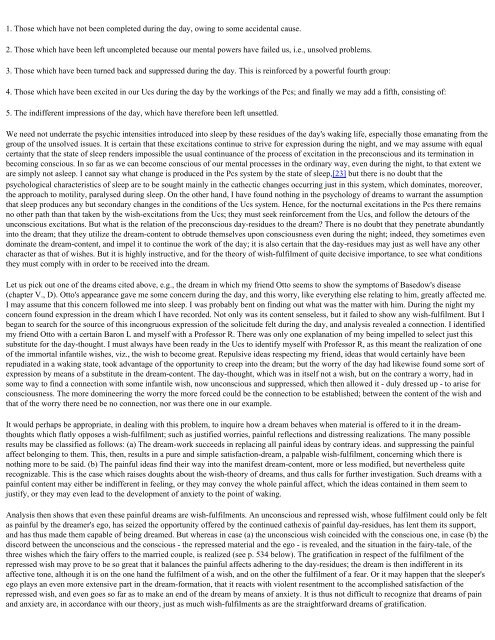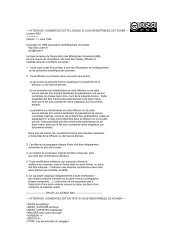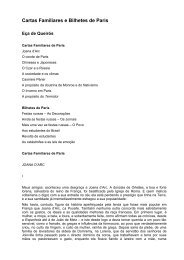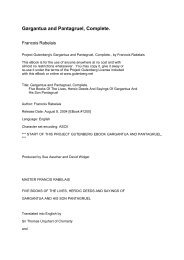The Interpretation of Dreams Sigmund Freud (1900)
The Interpretation of Dreams Sigmund Freud (1900)
The Interpretation of Dreams Sigmund Freud (1900)
You also want an ePaper? Increase the reach of your titles
YUMPU automatically turns print PDFs into web optimized ePapers that Google loves.
1. Those which have not been completed during the day, owing to some accidental cause.<br />
2. Those which have been left uncompleted because our mental powers have failed us, i.e., unsolved problems.<br />
3. Those which have been turned back and suppressed during the day. This is reinforced by a powerful fourth group:<br />
4. Those which have been excited in our Ucs during the day by the workings <strong>of</strong> the Pcs; and finally we may add a fifth, consisting <strong>of</strong>:<br />
5. <strong>The</strong> indifferent impressions <strong>of</strong> the day, which have therefore been left unsettled.<br />
We need not underrate the psychic intensities introduced into sleep by these residues <strong>of</strong> the day's waking life, especially those emanating from the<br />
group <strong>of</strong> the unsolved issues. It is certain that these excitations continue to strive for expression during the night, and we may assume with equal<br />
certainty that the state <strong>of</strong> sleep renders impossible the usual continuance <strong>of</strong> the process <strong>of</strong> excitation in the preconscious and its termination in<br />
becoming conscious. In so far as we can become conscious <strong>of</strong> our mental processes in the ordinary way, even during the night, to that extent we<br />
are simply not asleep. I cannot say what change is produced in the Pcs system by the state <strong>of</strong> sleep,[23] but there is no doubt that the<br />
psychological characteristics <strong>of</strong> sleep are to be sought mainly in the cathectic changes occurring just in this system, which dominates, moreover,<br />
the approach to motility, paralysed during sleep. On the other hand, I have found nothing in the psychology <strong>of</strong> dreams to warrant the assumption<br />
that sleep produces any but secondary changes in the conditions <strong>of</strong> the Ucs system. Hence, for the nocturnal excitations in the Pcs there remains<br />
no other path than that taken by the wish-excitations from the Ucs; they must seek reinforcement from the Ucs, and follow the detours <strong>of</strong> the<br />
unconscious excitations. But what is the relation <strong>of</strong> the preconscious day-residues to the dream? <strong>The</strong>re is no doubt that they penetrate abundantly<br />
into the dream; that they utilize the dream-content to obtrude themselves upon consciousness even during the night; indeed, they sometimes even<br />
dominate the dream-content, and impel it to continue the work <strong>of</strong> the day; it is also certain that the day-residues may just as well have any other<br />
character as that <strong>of</strong> wishes. But it is highly instructive, and for the theory <strong>of</strong> wish-fulfilment <strong>of</strong> quite decisive importance, to see what conditions<br />
they must comply with in order to be received into the dream.<br />
Let us pick out one <strong>of</strong> the dreams cited above, e.g., the dream in which my friend Otto seems to show the symptoms <strong>of</strong> Basedow's disease<br />
(chapter V., D). Otto's appearance gave me some concern during the day, and this worry, like everything else relating to him, greatly affected me.<br />
I may assume that this concern followed me into sleep. I was probably bent on finding out what was the matter with him. During the night my<br />
concern found expression in the dream which I have recorded. Not only was its content senseless, but it failed to show any wish-fulfilment. But I<br />
began to search for the source <strong>of</strong> this incongruous expression <strong>of</strong> the solicitude felt during the day, and analysis revealed a connection. I identified<br />
my friend Otto with a certain Baron L and myself with a Pr<strong>of</strong>essor R. <strong>The</strong>re was only one explanation <strong>of</strong> my being impelled to select just this<br />
substitute for the day-thought. I must always have been ready in the Ucs to identify myself with Pr<strong>of</strong>essor R, as this meant the realization <strong>of</strong> one<br />
<strong>of</strong> the immortal infantile wishes, viz., the wish to become great. Repulsive ideas respecting my friend, ideas that would certainly have been<br />
repudiated in a waking state, took advantage <strong>of</strong> the opportunity to creep into the dream; but the worry <strong>of</strong> the day had likewise found some sort <strong>of</strong><br />
expression by means <strong>of</strong> a substitute in the dream-content. <strong>The</strong> day-thought, which was in itself not a wish, but on the contrary a worry, had in<br />
some way to find a connection with some infantile wish, now unconscious and suppressed, which then allowed it - duly dressed up - to arise for<br />
consciousness. <strong>The</strong> more domineering the worry the more forced could be the connection to be established; between the content <strong>of</strong> the wish and<br />
that <strong>of</strong> the worry there need be no connection, nor was there one in our example.<br />
It would perhaps be appropriate, in dealing with this problem, to inquire how a dream behaves when material is <strong>of</strong>fered to it in the dreamthoughts<br />
which flatly opposes a wish-fulfilment; such as justified worries, painful reflections and distressing realizations. <strong>The</strong> many possible<br />
results may be classified as follows: (a) <strong>The</strong> dream-work succeeds in replacing all painful ideas by contrary ideas. and suppressing the painful<br />
affect belonging to them. This, then, results in a pure and simple satisfaction-dream, a palpable wish-fulfilment, concerning which there is<br />
nothing more to be said. (b) <strong>The</strong> painful ideas find their way into the manifest dream-content, more or less modified, but nevertheless quite<br />
recognizable. This is the case which raises doughts about the wish-theory <strong>of</strong> dreams, and thus calls for further investigation. Such dreams with a<br />
painful content may either be indifferent in feeling, or they may convey the whole painful affect, which the ideas contained in them seem to<br />
justify, or they may even lead to the development <strong>of</strong> anxiety to the point <strong>of</strong> waking.<br />
Analysis then shows that even these painful dreams are wish-fulfilments. An unconscious and repressed wish, whose fulfilment could only be felt<br />
as painful by the dreamer's ego, has seized the opportunity <strong>of</strong>fered by the continued cathexis <strong>of</strong> painful day-residues, has lent them its support,<br />
and has thus made them capable <strong>of</strong> being dreamed. But whereas in case (a) the unconscious wish coincided with the conscious one, in case (b) the<br />
discord between the unconscious and the conscious - the repressed material and the ego - is revealed, and the situation in the fairy-tale, <strong>of</strong> the<br />
three wishes which the fairy <strong>of</strong>fers to the married couple, is realized (see p. 534 below). <strong>The</strong> gratification in respect <strong>of</strong> the fulfilment <strong>of</strong> the<br />
repressed wish may prove to be so great that it balances the painful affects adhering to the day-residues; the dream is then indifferent in its<br />
affective tone, although it is on the one hand the fulfilment <strong>of</strong> a wish, and on the other the fulfilment <strong>of</strong> a fear. Or it may happen that the sleeper's<br />
ego plays an even more extensive part in the dream-formation, that it reacts with violent resentment to the accomplished satisfaction <strong>of</strong> the<br />
repressed wish, and even goes so far as to make an end <strong>of</strong> the dream by means <strong>of</strong> anxiety. It is thus not difficult to recognize that dreams <strong>of</strong> pain<br />
and anxiety are, in accordance with our theory, just as much wish-fulfilments as are the straightforward dreams <strong>of</strong> gratification.









